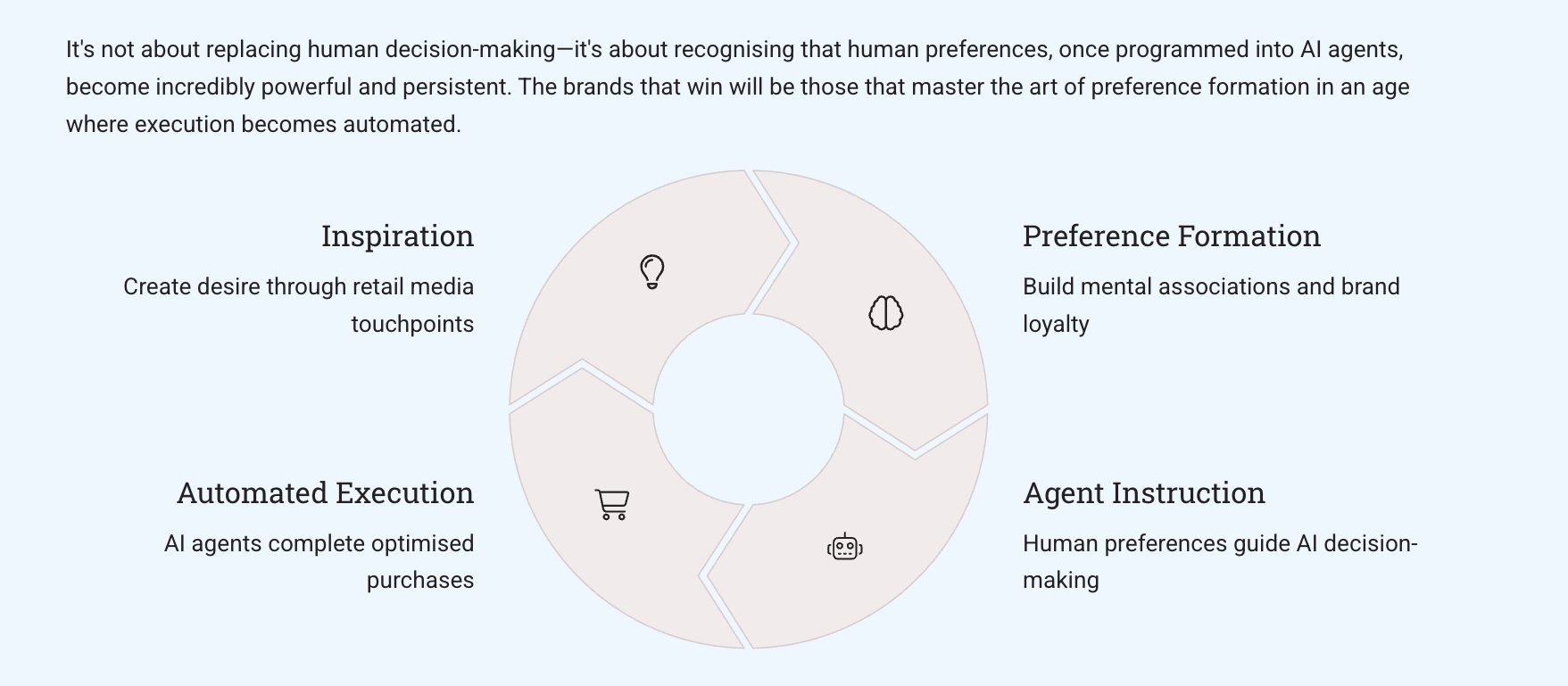
Why agentic AI makes brand-building retail media’s new superpower
Ahead of his session at REmade tomorrow, Alberto Vergara, head of data and AI at retail media platform, Zitcha, paints a provocative picture of the future of retail — where AI agents take over shopping decisions, snapping, scanning and buying on our behalf — showing why the true battleground won’t be clicks or carts, but the human mind.

Alberto Vergara will be speaking at REmade in Sydney on Tuesday
Imagine walking into a store, seeing something you like, snapping a photo and telling your AI agent ‘Buy this for me at the best price, but wait for a discount in the next two months’.Your agent goes to work, comparing prices, tracking deals, and executing the purchase when conditions are optimal. No more browsing, comparing, or clicking add to cart. This isn’t science fiction, it’s the near future of commerce, and it’s about to upend everything we know about retail media.
We’ve been here before. Remember Toys R Us. Parents would take their kids to view, experience and play with toys in its stores and then head home and order them for a cheaper price on Amazon. Physical retail became an expensive showroom for eCommerce giants.
Now we’re heading for Showrooming 2.0, but this time it’s different. The battle won’t be fought on price alone, it’ll be fought in the human mind, before the agent even starts shopping.
When your customer becomes a machine
Here’s the uncomfortable truth for some in the retail marketing world. If AI agents are making purchase decisions, traditional performance marketing as we know it becomes obsolete. There is no longer a need to bid on keywords or optimise for clicks. The customer is now a machine, albeit an AI Agent, that doesn’t browse, doesn’t get distracted by banner ads, and certainly doesn’t impulse buy.
But I believe advertising has never been more important. The new battleground isn’t the moment of purchase, it’s the moment of instruction. When a human tells their agent ‘I need quality headphones’, do they think Bose, Sony, or something else entirely? That split-second brand association, embedded in a consumer’s mind through years of advertising, becomes the agent’s north star.
The preference programming game
We’re moving into the preference programming era, where the goal isn’t to capture attention at the point of sale, but to occupy mental real estate that gets translated into agent instructions.
Consider Apple. When someone with strong Apple brand loyalty tells their agent ‘Buy me a new phone’, that agent isn’t going to waste time comparing Android alternatives. The consumer’s preference has already filtered the universe of possibilities.
This is why traditional brand building, the emotional connections, the lifestyle aspirations, the community building, suddenly becomes the most valuable real estate in marketing. You’re not just competing for market share; you’re competing for mind share that gets programmed into AI agents.
Retail media’s secret weapon
Here’s where it gets interesting for retail media networks. While payment processors and tech giants are investing heavily in the infrastructure of agentic commerce such as the security, the execution and fulfilment, they’re missing the most crucial piece, the experiential layer where preferences get formed.
Retail media networks have something that pure-play payment processors don’t. They own the inspiration moment. They control the digital and physical touchpoints where humans discover, desire, and ultimately decide what they want their agents to prioritise.
When Target creates an immersive homeware display that makes someone think ‘I want to redecorate like that’, and then that person instructs their agent accordingly, Target has won the game before it even started. The agent becomes a sophisticated executor of a preference that was carefully cultivated through retail media.
The GEO revolution?
While we’re preparing for agentic commerce, another seismic shift is happening now. Search engine optimisation (SEO) is rapidly giving way to generative engine optimisation (GEO) – optimising for AI summary citations rather than traditional search rankings.
Web traffic is increasingly being captured by AI summaries at the top of search results. Users read the AI-generated answer and move on, never clicking through to the source websites. For brands, the new competition isn’t for the first page of Google, it’s for a citation in the AI summary.
This shift actually rewards quality content over SEO tricks. The AI systems are better at assessing genuine relevance and expertise, cutting through the artificial manipulation tactics that have gamed traditional search for years.
For retailers and brands watching this unfold, the message is to start preparing now. The companies investing in AI-powered retail media capabilities, the ones thinking about how to shape agent instructions rather than just capture transactions, will have a massive advantage.
It’s not about replacing human decision-making, it’s about recognising that human preferences, once programmed into AI agents, become incredibly powerful and persistent. The brands that win will be those that master the art of preference formation in an age where execution becomes automated.
The retail media landscape is about to get a lot more strategic, a lot more focused on long-term brand building, and a lot more important to overall business success. Agentic commerce is coming, as with the acceleration of retail media, the ones that move fastest will be the ones to reap the rewards.
Vergara will talk further about the impacts of Agentic AI on retail media at REmade on 23 September. To book tickets, click here.



